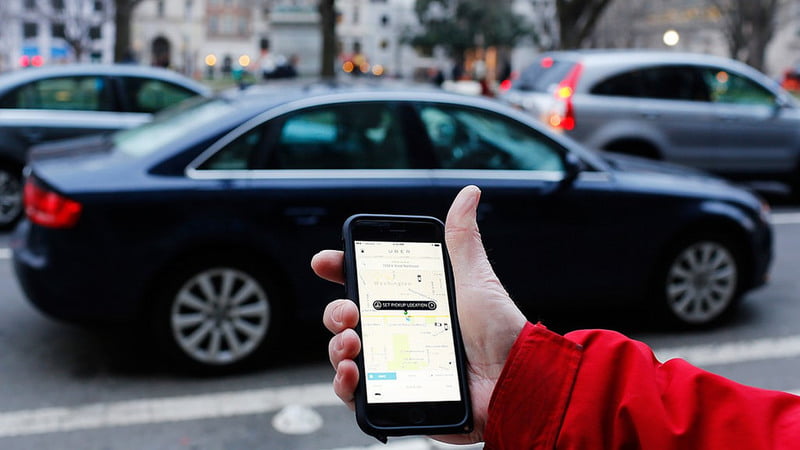
In the midst of disruption, the transportation industry has been undergoing changes with the introduction of the sharing economy, put in motion by mobile apps. From mass transportation services to individual rides, this sector has become the hotspot for many companies attempting to break into a lucrative area. While still a controversial industry, this has not deterred millions from using transportation apps that embody both convenience and cost-effective methods of travelling. In this article, we look at the top 5 free transportation apps on the Google Play Store that offer either the highest utility or are the most cost-effective means of getting around.
Uber
Being one of the most prominent ride-sharing apps on the market, Uber offers the cheapest method of commuting by significantly undercutting many of its rivals, particularly traditional taxi service. While legislation around the world is often left playing catch-up to the changing dynamic of Uber’s policies, it is quickly becoming the preferred method of transportation. Housing an easy-to-use app that quickly connects a rider and driver, its convenience triumphs comparative services by offering various tools such as the ability to directly contact the driver, a cashless payment system, live tracking of driver distance, and a rating system to ensure that all drivers meet quality checks. With frequent updates to their business model, Uber constantly provides new services that make it a must-have app for more than just travelling, including UberEATS and UberPOOL.
Lyft
An on-demand ride sharing service similar to Uber, Lyft is another essential for regular commuters. While much of its core features are comparable to Uber, its unique value proposition stems from two factors, namely it’s pricing during peak times and rider experience. Although both Uber and Lyft have price increases during times of greater demand, Lyft has a cap on the amount that prices can increase by while Uber lacks this limit, having increases by 8-9 times the regular price in the most extreme cases. Furthermore, Lyft drivers carry a more sociable culture with riders, having themed rides ranging from Harry Potter to Trivia. Oppositely, the experience of Uber rides is more formal and closely resembles a limousine that disconnects the two parties. By offering a more unique experience for riders and better prices during peak times, Lyft is a must-have for those seeking a less formal ride.
Waze
With an increasing number of drivers on the road, the ever-growing issue of traffic has made Waze a highly applicable app for everyday commuting. Waze uses information compiled from other drivers on the road to create the largest network of drivers available, sharing real-time traffic information and road alerts to optimize the process of driving. With countless features that include identifying the best routes, authority traffic stops, accidents, and road closures, the app has become an essential for many people. As the number of Waze users continues to grow, so will the volume of compiled data and subsequently the level of detail that each driver receives. Although the use of GPS on mobile devices is known to drain battery life, users are incentivized to activate Waze to accumulate points in order to be greatest contributor in an area. In the event that Waze is left on after driving, it automatically recognizes that it is not actively being used and automatically disables the GPS.
Zipcar
For those who need a personal vehicle, Zipcar is the perfect solution as the most popular vehicle rental app. At extraordinarily cheap rates for rentals, Zipcar users are able to rent vehicles for hourly usage or up to 7 days at a time. Being simple and intuitive, the user is able to reserve a car in seconds by simply selecting location, car type, and a pickup location. With gas and insurance included in the price coupled with the use of a membership card to lock and unlock the doors, users have a stress-free experience in renting with Zipcar. Starting at only $7 per month or $8 per hour, Zipcar offers a cost-saving alternative to buying or leasing a car that includes the supplementary price of parking, insurance, and gas.
Curb
With Uber and Lyft drivers not as stringently interviewed as taxi drivers, some riders are left uncomfortable with the notion that someone who lacks professional training or correct licenses is able to give them rides. Curb, on the other hand, connects riders with professional taxi drivers in an effort to bolster safe and reliable transportation with the convenience of rival ride-sharing companies. Despite ongoing controversy surrounding whether taxi drivers or ride-sharing platforms offer greater safety for the rider, Curb contains over 50,000 cabs and 100,000 drivers globally, ensuring that riders are picked up within minutes of ordering a cab from the app. For those who prefer cash transactions, Curb also gives riders the option to pay either digitally through the app or with cash, a feature that is lacking in other platforms. Even if the cab is hailed without the app, users can conveniently pay with the Curb app by entering a digital code that appears on the drivers screen.
For those who are tired of owning a car, driving, or getting caught in traffic, these apps offer a wide array of services that make getting places a breeze. Most of these apps even offer a discount or free ride for first time riders so there is no cost in trying the services at least once.
What do you think of these apps? Do they deserve to be in the top of our list for transportation apps? Let us know in the comments below!
[Source: App Olicious]




